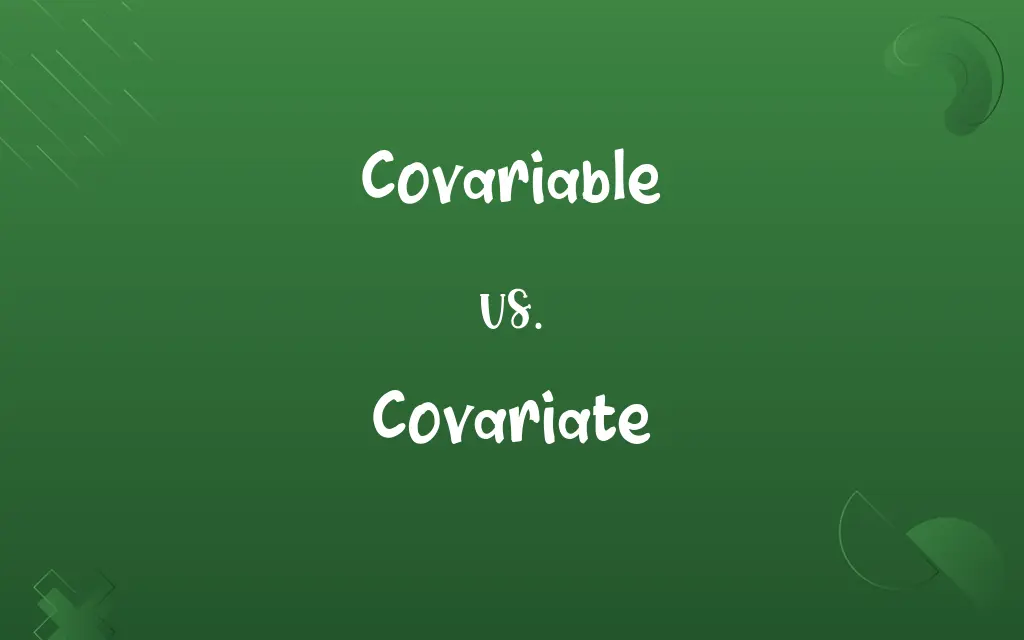Covariable vs. Covariate: Know the Difference

By Shumaila Saeed || Published on January 16, 2024
Covariable is a less common term often interchangeable with covariate, which is a variable used in statistical models to adjust or control for confounding effects.

Key Differences
The term "covariable" is not as commonly used as "covariate," but when it is, it typically refers to a variable that may be of secondary interest in a study or is controlled for in the analysis. On the other hand, "covariate" is a more prevalent term in statistics and research, representing a variable that is possibly predictive of the outcome under study. Both terms are often used interchangeably, but "covariate" is more widely recognized and accepted in statistical contexts.
Shumaila Saeed
Jan 16, 2024
In many statistical models, a covariable may refer to any additional variable that is not the primary focus of the study but is still included in the model. Covariate, in contrast, often specifically refers to a variable that is thought to have some influence on the dependent variable. For instance, in a medical study, age might be considered a covariate if researchers believe it could affect the main outcome, whereas other less influential factors might be termed covariables.
Shumaila Saeed
Jan 16, 2024
The use of "covariable" can sometimes imply a variable that is part of a group of variables being controlled for in an analysis, without being the main focus of interest. Covariate, however, is typically used to describe a variable that is of specific interest in understanding its relationship to the dependent variable. Both terms are essential in the context of multivariate analyses where multiple factors are considered simultaneously.
Shumaila Saeed
Jan 16, 2024
In certain contexts, "covariable" might be used to describe a variable that changes with another variable but is not necessarily of direct interest. Conversely, "covariate" is more often used when the variable in question is of direct interest and its relationship with the outcome is being specifically explored. This subtle difference highlights how terminology can vary slightly depending on the focus and intention of the analysis.
Shumaila Saeed
Jan 16, 2024
Finally, it’s important to note that while "covariable" and "covariate" can sometimes be used interchangeably, "covariate" is the more commonly used and recognized term in statistical analysis and research. The usage of "covariable" might be more common in certain subfields or contexts, but "covariate" remains the predominant term in most statistical discussions and literature.
Shumaila Saeed
Jan 16, 2024
ADVERTISEMENT
Comparison Chart
Usage Frequency
Less commonly used.
More commonly used and recognized in statistical contexts.
Shumaila Saeed
Jan 16, 2024
Primary Focus
Often a secondary variable or controlled for in the analysis.
Usually a primary variable of interest, especially in its relation to the outcome.
Shumaila Saeed
Jan 16, 2024
Contextual Implication
Implies a variable part of a group being controlled for.
Directly implies interest in exploring its relationship with the outcome.
Shumaila Saeed
Jan 16, 2024
Scope in Analysis
May refer to any additional variable not the main focus.
Specifically refers to a variable thought to influence the dependent variable.
Shumaila Saeed
Jan 16, 2024
Field Variance
Usage can be more common in certain subfields or contexts.
Broadly used across various fields and studies.
Shumaila Saeed
Jan 16, 2024
ADVERTISEMENT
Covariable and Covariate Definitions
Covariable
A variable controlled for in research to reduce bias.
Gender was used as a covariable in the clinical trial to ensure balanced results.
Shumaila Saeed
Jan 11, 2024
Covariate
A variable whose influence on the primary outcome is analyzed.
In the study, exercise frequency was a covariate in assessing stress levels.
Shumaila Saeed
Jan 11, 2024
Covariable
An additional factor in a study, not of primary interest.
The researchers included economic status as a covariable in their analysis of diet and health.
Shumaila Saeed
Jan 11, 2024
Covariate
A variable tested for its statistical relationship with the dependent variable.
The study explored income as a covariate affecting health outcomes.
Shumaila Saeed
Jan 11, 2024
Covariable
A supplementary variable considered in data analysis.
The study on climate change effects included urbanization as a covariable.
Shumaila Saeed
Jan 11, 2024
ADVERTISEMENT
Covariate
An independent variable in regression analysis.
Age was considered a covariate in analyzing consumer buying habits.
Shumaila Saeed
Jan 11, 2024
Covariable
A variable that is adjusted for in statistical models.
Education level was accounted for as a covariable in the employment study.
Shumaila Saeed
Jan 11, 2024
Covariate
A factor whose effect on the outcome is of specific interest.
The researchers examined smoking status as a covariate in lung disease prevalence.
Shumaila Saeed
Jan 11, 2024
Covariable
A secondary variable included in statistical analysis.
In studying medication efficacy, patient age was treated as a covariable.
Shumaila Saeed
Jan 11, 2024
Covariate
A predictor variable in statistical models.
The effect of education on income was analyzed with education as a covariate.
Shumaila Saeed
Jan 11, 2024
Covariate
(statistics) A variable that is possibly predictive of the outcome under study.
Shumaila Saeed
Jan 10, 2024
Repeatedly Asked Queries
Are covariables always controlled for in analysis?
Typically, yes, they are included to control for other factors.
Shumaila Saeed
Jan 16, 2024
What is a primary difference in usage between "covariable" and "covariate"?
"Covariable" often implies a secondary or controlled variable, whereas "covariate" is a primary variable of interest.
Shumaila Saeed
Jan 16, 2024
Is "covariable" commonly used in statistics?
No, "covariable" is less common compared to "covariate."
Shumaila Saeed
Jan 16, 2024
Can the role of a covariable and covariate overlap in a study?
Yes, depending on the study design and analysis.
Shumaila Saeed
Jan 16, 2024
What does "covariate" typically refer to in a study?
It refers to a variable thought to influence the outcome of interest.
Shumaila Saeed
Jan 16, 2024
Can "covariable" and "covariate" be used interchangeably?
Yes, but "covariate" is more widely recognized and preferred.
Shumaila Saeed
Jan 16, 2024
Does the inclusion of a covariable imply bias in a study?
No, it's included to control for potential bias, not indicate it.
Shumaila Saeed
Jan 16, 2024
Is "covariable" a term widely used across all fields?
No, its usage varies and is less common than "covariate."
Shumaila Saeed
Jan 16, 2024
Can a covariate be a primary focus in a statistical model?
Yes, covariates are often primary variables of interest.
Shumaila Saeed
Jan 16, 2024
Does a covariate always influence the dependent variable?
It is included in analysis because it is thought to possibly influence the outcome.
Shumaila Saeed
Jan 16, 2024
Is understanding covariates crucial in statistical analysis?
Yes, as they can significantly impact the results and interpretations.
Shumaila Saeed
Jan 16, 2024
Do covariates always have a direct relationship with the outcome?
Not always; their relationship can be complex and multifaceted.
Shumaila Saeed
Jan 16, 2024
Are covariables less important than covariates in analysis?
Not necessarily, their importance depends on the research question and context.
Shumaila Saeed
Jan 16, 2024
Do all statistical models include covariates?
Many do, but it depends on the model and research question.
Shumaila Saeed
Jan 16, 2024
Is it necessary to control for covariables in every study?
It depends on the study's aim and the variables' relevance.
Shumaila Saeed
Jan 16, 2024
Are covariables always numerical?
No, they can be categorical or numerical.
Shumaila Saeed
Jan 16, 2024
Can a covariate be a demographic factor?
Yes, factors like age, gender, or income can be covariates.
Shumaila Saeed
Jan 16, 2024
Can a variable be both a covariable and covariate in different studies?
Yes, depending on the study focus and design.
Shumaila Saeed
Jan 16, 2024
Is expertise in statistics required to understand covariates?
Basic understanding is helpful, but detailed knowledge depends on the complexity of the analysis.
Shumaila Saeed
Jan 16, 2024
Can the misuse of covariates lead to incorrect conclusions?
Yes, improper use or interpretation of covariates can affect study results.
Shumaila Saeed
Jan 16, 2024
Share this page
Link for your blog / website
HTML
Link to share via messenger
About Author
Written by
Shumaila SaeedShumaila Saeed, an expert content creator with 6 years of experience, specializes in distilling complex topics into easily digestible comparisons, shining a light on the nuances that both inform and educate readers with clarity and accuracy.








































































